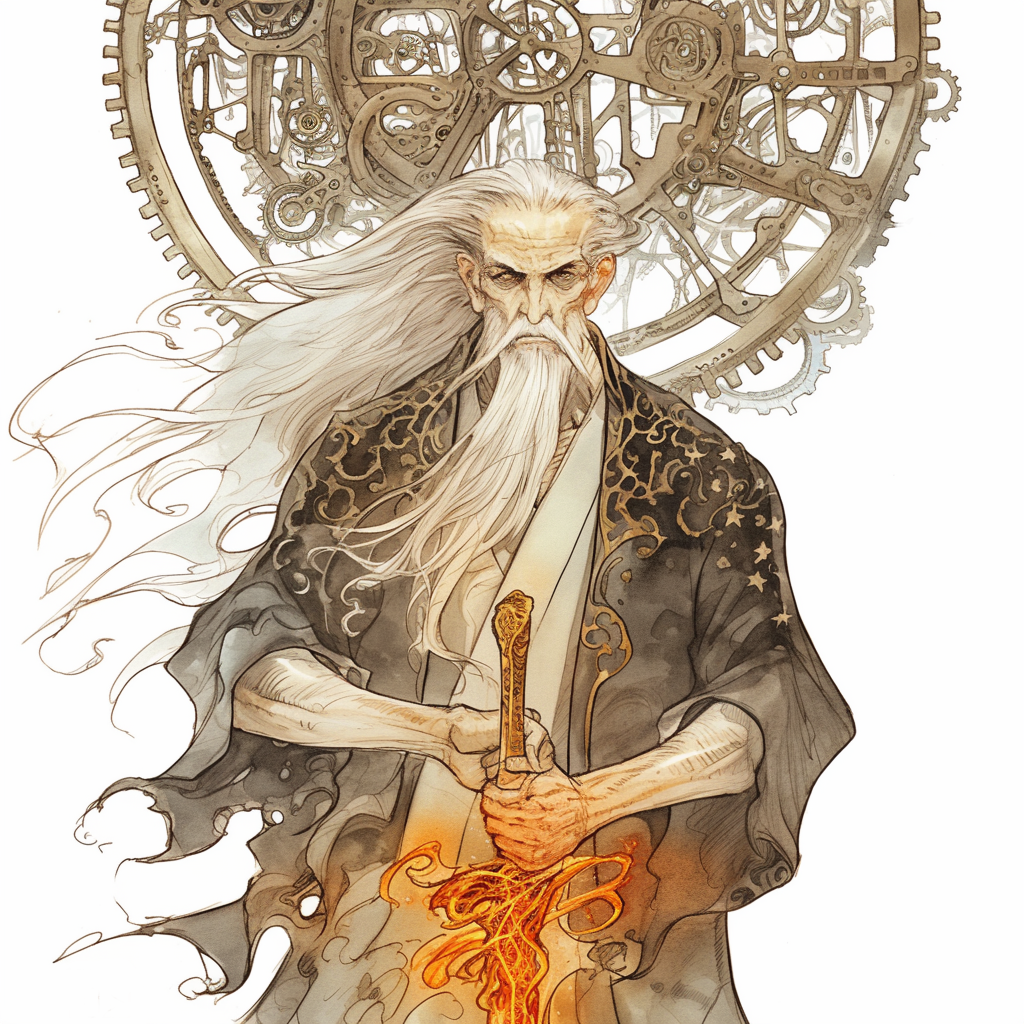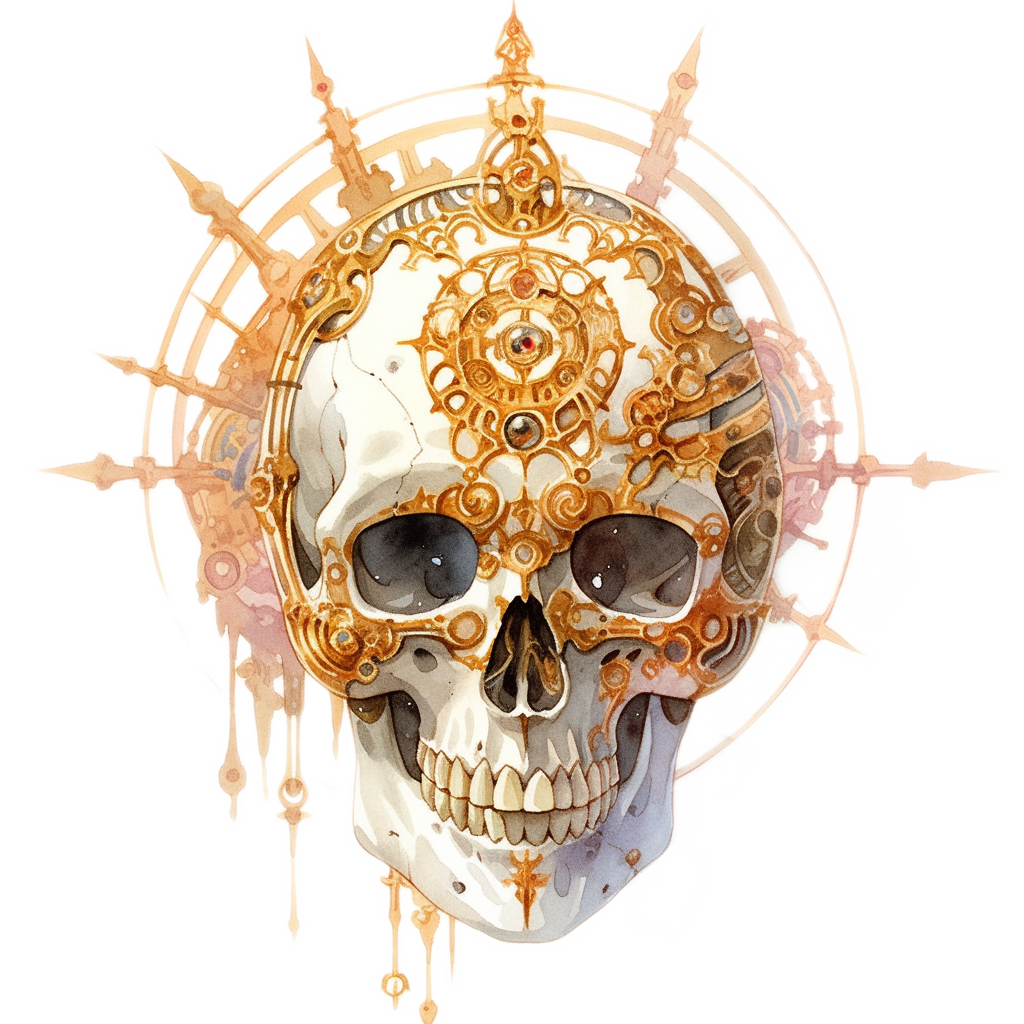Lendor

The Price of Time, the Master of Tedium. LN Intermediate power of time and patience (He/Him)
Pantheon: Suel (Oerdian) — Leader
Symbol: A crescent moon in front of a full moon, surrounded by stars
Realm: Mechanus / Wheel of Time
Known Proxies: Moment of Now, Pace of Ages, Tempo of Never (planar bythos aeons [they/them] / LN)
Lendor, the god of Time, Tedium, Patience, and Study, is one of the withdrawn powers, who prefers not to engage with the multiverse at large, if he can help it. The leader of the Suel powers of the wider Oerdian pantheon, Lendor considers himself superior to the other gods, especially those he has fathered.
He commonly takes one of three forms, depending on the nature of his business. The most typical is an older man with flowing silvery-white hair, a fine beard, and sharp, discerning eyes that seem to pierce through time itself. This is his most aggressive form, assumed when he wants to assert the concept inevitability, and the one where he wields a sword name Afterglow. Chant goes that Lendor started time and created the multiverse with a single strike of this blade. But the chant says a lot, frankly…
When Lendor wishes to embody patience, he instead adopts the form of either a regal silver dragon or if he wishes to appear more approachable, a serene female elf with robes that shimmer like the night sky.

Philosophically, Lendor’s teachings emphasise perspective, patience, and the endurance of fundamental laws that span eons. His dogma asserts that time is a vast, infinite continuum where mortal lives are but fleeting sparks. To Lendor, the present is a transient moment that only achieves meaning when viewed against the backdrop of eternity. His followers are urged to adopt a cosmic viewpoint, tempering their haste and ambition with the knowledge that all things must unfold according to the universal rhythm. This devotion to patience often borders on tedium, earning Lendor his secondary title, “Master of Tedium.” His philosophy reveres study and intellectual rigour, offering wisdom to those disciplined enough to endure long recitations of law and history.
However, critics—both divine and Athar—deride Lendor’s detachment, accusing him of prioritising distant, impersonal concerns over the immediate needs of mortals and powers alike. Indeed, his primary concern in the multiverse is focussing on the preservation and balance of time, and even this he delegates to a trio of bythos aeons, called the Moment of Now, the Pace of Ages, and the Tempo of Never.
His role is complementary to that of Primus. While the One and the Prime enforces the logic and maintains the structure of great machine, Lendor aligns its mechanisms with the grand temporal currents of the multiverse. His realm, the Wheel of Time, exists as a vast, interlocking web of celestial gears that orbit slightly out of sync with the rest of Mechanus. These gears are timeless observatories, where Lendor’s enigmatic servants, the celestial spectators, record and monitor the flow of time. Lendor rarely interacts with the modrons directly, yet Primus sees him as an ally in preserving cosmic order. The modrons view his influence as a paradox—perfectly lawful yet inscrutable in its temporal complexity, a situation that frustrates their linear logic.
Lendor’s relationship with Mechanus’s other denizens, the formians, is rather more strained. While the formians are staunch adherents of order, their territorial expansion plans sometimes disrupt Mechanus’s temporal harmony. When their industry threatens the local flow of time, Lendor intervenes directly, wielding Afterglow to seal temporal breaches. The formian queens, ever pragmatic, interpret these interventions as divine rebukes, adjusting their plans accordingly. Over time, some formian philosophers have come to revere Lendor, perceiving his actions as a reminder of the futility of defying the eternal tide of time.
Lendor’s church is a small, secluded order of sages, archivists, and scholars who maintain shrines around Mechanus. His temples are solemn sanctuaries, adorned with massive hourglasses, intricate pendulums, and starry murals depicting the infinite expanse of time. Worship in his church is a meticulous affair, with interminable rites and long, drawn-out recitations conducted by elderly priests. These clergy are fiercely devoted to the god’s ideals of patience and study, though the lack of young adherents suggests a faith in decline. Still, younger priests occasionally venture beyond their cloistered halls, serving as historians, advisors, or seekers of long-lost knowledge.
Sources:
- Jon Winter-Holt
- GreyhawkOnline
- Bythos aeon [PF2e]
- Spectator [AD&D 2e]



